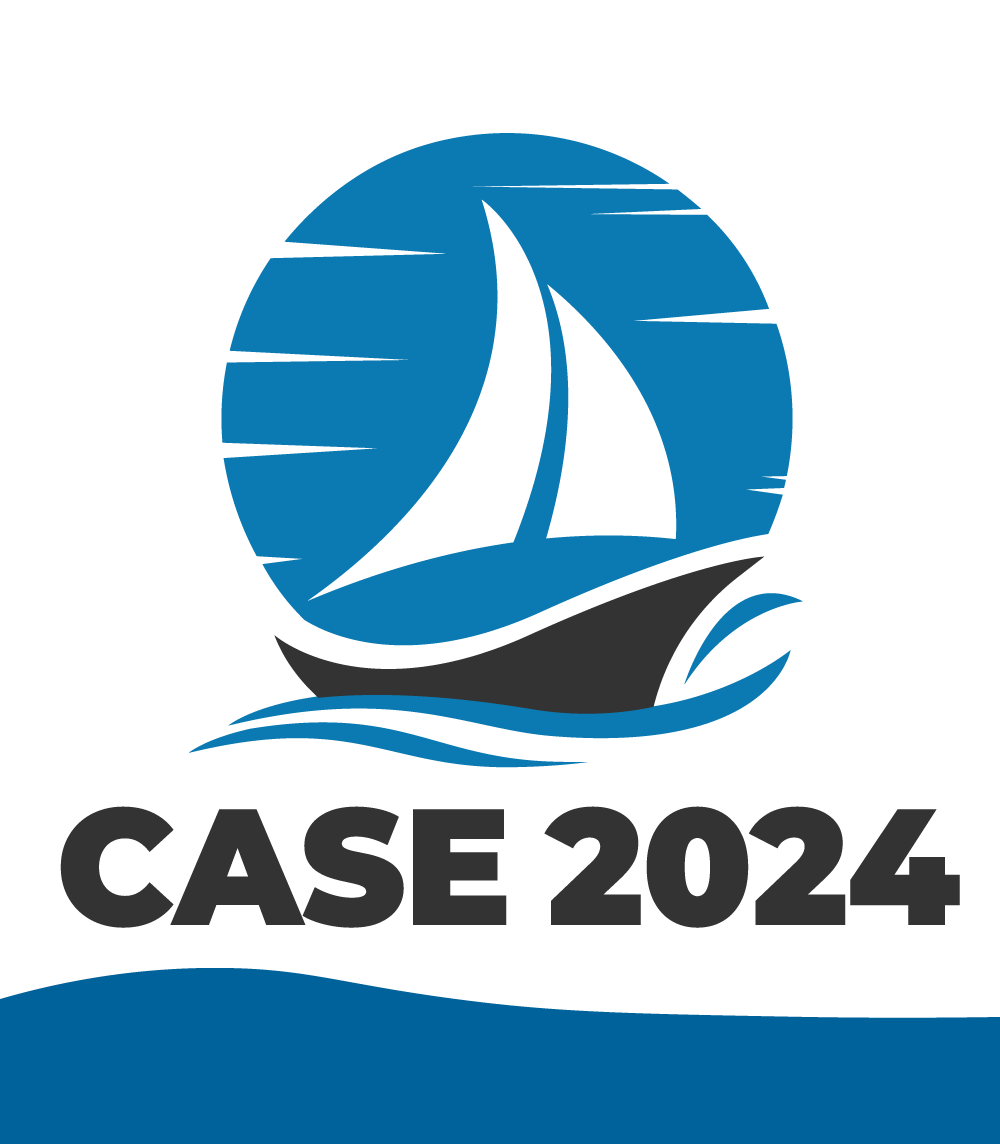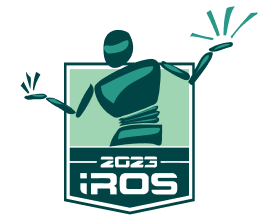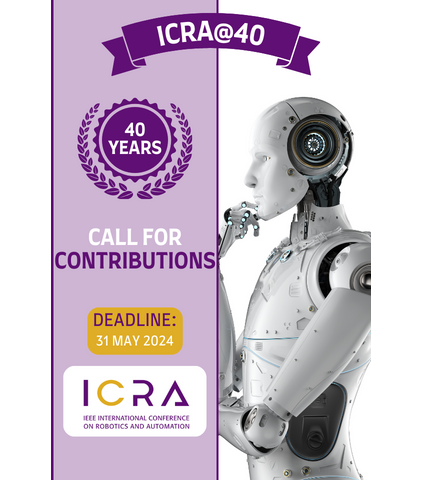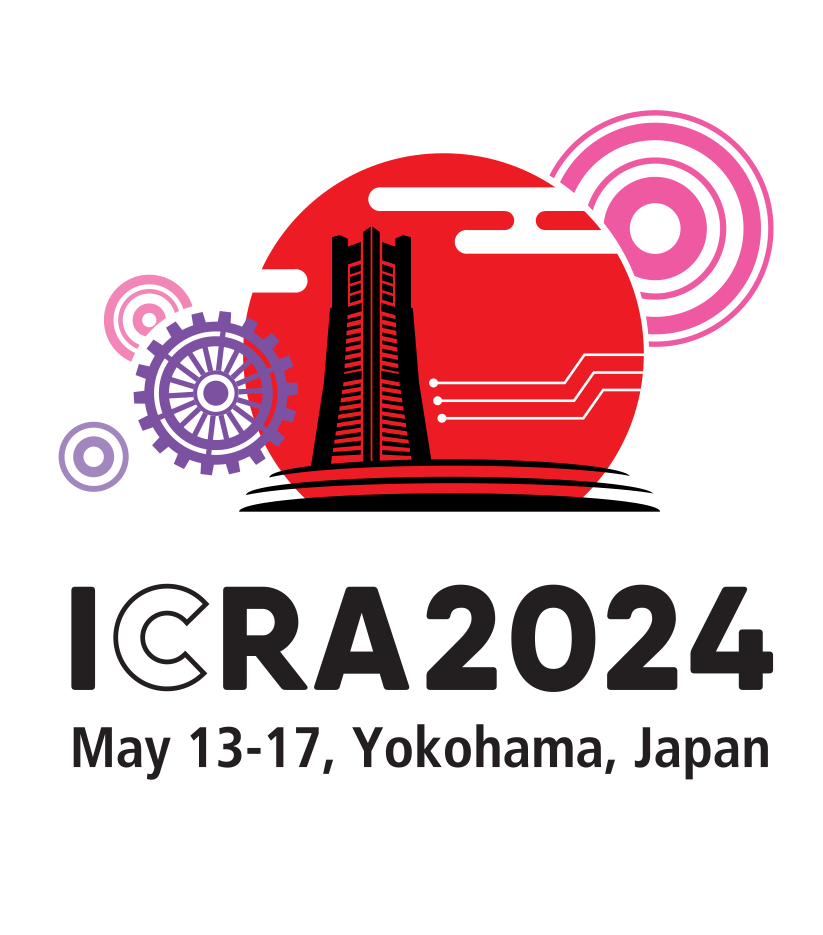Latest News
With heartfelt gratitude the IEEE Robotics & Automation Society (RAS) and the robotics community bids farewell to Ken Goldberg, who enthusiastically served from 2011-2016 as Editor-in-Chief of T-ASE. Successor Michael Yu Wang has some big shoes to fill, but will be assisted by Samantha Jacobs and the T-ASE Editorial Team.
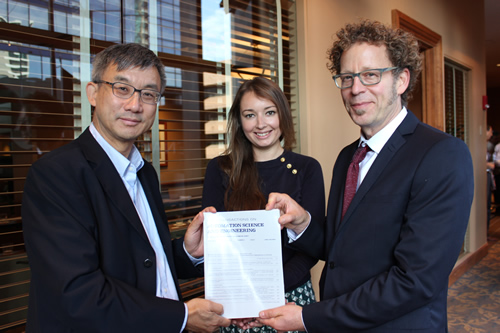
Ken Goldberg, UC Berkeley, took the helm in October 2011 and never looked back. The journal has grown in volume and page count, in prestige, and has seen huge growth in reach and impact factor during his tenure. In his last Editorial, Ken reviews the team effort that doubled the T-ASE Impact Factor over 5 years and quotes RAS Past President Raja Chatila: "One Robot is Robotics, Ten Robots is Automation":
http://ieeexplore.ieee.org/stamp/stamp.jsp?tp=&arnumber=7583767
Automation has now come of age! RAS, the T-ASE Editors and Associate Editors, and the automation community will miss the Leadership provided by Ken. We wish him well in all future endeavors!
Ken is succeeded by Michael Yu Wang, Hong Kong University of Science and Technology. mywang@ust.hk
Michael's areas of expertise are as follows:
Primary areas: Human-Centered Automation, Assembly Modeling, Manufacturing, Grasping, Fixturing, Feeding.
Secondary areas: Theoretical Methods, Algorithmic Foundations, Machine Tools, Numerical Optimization.
IEEE Transactions on Cognitive and Developmental Systems
Special Issue on Bio-inspired Social Robot Learning in Home Scenarios
http://www.informatik.uni-hamburg.de/wtm/SocialRobotsWorkshop2016/CFP_TCDS_SI_SocialRobots.pdf
CALL FOR PAPERS
There has been considerable progress in robotics in the last years allowing robots to successfully contribute to our society. We can find them from industrial environments, where they are nowadays established, to domestic places, where their presence is steadily rising. The proposed special issue intends to explore the following question: "How well prepared are learning robots to be social actors in daily-life home environments in the near future."
The special issue is therefore not only an opportunity to address this focuses on the latest scientific contributions on bio-inspired learning and social robotics, but also links them with a clear focus to push the presence of robots in people's daily-life environment. Thus, one main goal of the special issue is offering a common foundation for roboticists from different fields of expertise to contribute beyond the current state-of-the-art of learning methods in robotics especially applied to home scenarios and recent developments in assistive robots.
The subjects of the special issue include, but are not limited to:
- Interactive reinforcement learning.
- Policy and reward shaping.
- Neural learning of object affordances and contextual affordances.
- Predictive learning from sensorimotor information.
- Learning understanding of environment ambiguity.
- Learning with hierarchical and deep neural architectures.
- Bootstrapping complex action learning in robots.
- Learning supported by external trainers, by demonstration and imitation.
- Parental scaffolding as a bootstrapping method for learning.
SUBMISSIONS
The special issue is open for all submissions which will be independently peer-reviewed in accordance with IEEE policy. Manuscripts should be prepared according to the "Information for Authors" of the journal, found at http://cis.ieee.org/publications.html, and submitted through the IEEE TCDS Manuscript center under the category: "SI: Social Robots": https://mc.manuscriptcentral.com/tcds-ieee. Papers submitted must not have been published previously, though they may represent significant extensions of prior work.
IMPORTANT DATES
31 January 2017 - Deadline for manuscript submission.
15 April 2017 - Notification of authors.
15 May 2017 - Deadline for revised manuscripts.
15 June 2017 - Final decisions.
For further information, please contact one of the following guest editors in this order:
Francisco Cruz - Knowledge Technology Institute, University of Hamburg, Germany - cruz@informatik.uni-hamburg.de
Jimmy Baraglia - Emergent Robotics Laboratory, Osaka University, Japan - jimmy.baraglia@ams.eng.osaka-u.ac.jp
Yukie Nagai - Emergent Robotics Laboratory, Osaka University, Japan - yukie@ams.eng.osaka-u.ac.jp
Stefan Wermter - Knowledge Technology Institute, University of Hamburg, Germany - wermter@informatik.uni-hamburg.de
2016 IEEE International Conference on Simulation, Modeling, and Programming for Autonomous Robots
San Francisco, California USA
13-16 December 2016
http://simpar2016.org
CALL FOR PARTICIPATION
Early Registration Deadline: 31 October 2016
After a very selective review process, approximately half of the paper submissions were rejected, and we are looking forward to a high-quality, single track program of IEEE SIMPAR 2016.
PLENARY SPEAKERS
Emo Todorov
Erwin Coumans
Luis Sentis
WORKSHOPS
Combining Optimal Control, Reinforcement Learning and Movement
Primitives to Achieve Better Robot Motions
Organizer: Katja Mombaur
Grand Challenges in Robotic Simulation
Organizer: Evan Drumwright
Modeling and Simulating Mechanical Rigid-Body Systems Using Siconos
Organizers: Vincent Acary and Stephen Sinclair
The Role of Simulation in Robot Programming
Organizers: Maria Gini and Enrico Pagello
TECHNICAL TOURS
Technical tours will be held on 17 December 2016 (incl. robotics lab tours at UC Berkeley and Stanford University).
VENUE, ACCOMMODATION, AND SOCIAL EVENTS
The Parc 55 – A Hilton Hotel
We offer discounted room rates for SIMPAR attendees.
On 14 December 2016, all conference attendees will be able to enjoy a beautiful dinner cruise on the San Francisco Bay.
WAFR 2016
The 2016 International Workshop on the Algorithmic Foundations of Robotics (WAFR) will take place in San Francisco from 18-20 December 2016, adjacent to SIMPAR 2016.
http://wafr2016.berkeley.edu/
SCOPE AND TOPICS
3D robot simulation and mathematical modeling of robots
Learning from simulation
Reliability, scalability and validation of robot simulation
Simulated sensors and actuators
Machine learning for robotics applications
Offline simulation of robot design
Online simulation with real-time constraints
Simulation with software/hardware in the loop
Middleware for robotics
Modeling framework for robots and environments
Testing and validation of robot software
Standardization for robotic services
Communication infrastructures in distributed robotics
Interaction between sensor networks and robots
Human robot interaction and collaboration
Simulation of multi-robot systems
Model-based optimization and optimal control
Model predictive control
CONTACT
If you have questions, need additional support, or encounter problems, please do not hesitate to reach out to us at info@simpar2016.org.
2017 IEEE RAS–SIGHT Humanitarian Robotics & Automation Technology Challenge (HRATC'17)
29-30 May, ICRA 2017, Singapore (Porto Alegre, Brazil remotely)
http://www.inf.ufrgs.br/hratc2017/HRATC_2017/
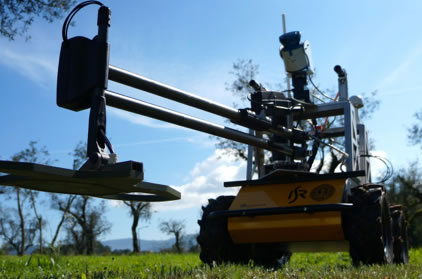
ORGANIZERS
Edson Prestes (UFRGS, Brazil)
Alexandre Amory (PUCRS, Brazil)
Raj Madhavan (HumRobTech, LLC, & IEEE RAS-SIGHT, USA)
The fourth HRATC edition will follow the footsteps of previous ones and continue to focus on promoting the development of new strategies for autonomous landmine detection using a mobile (ground) robot. HRATC Challenge has three phases: 1) Simulation Phase, 2) Testing Phase, and 3) Finals Phase. The strategies developed by the participating teams will be according to the following criteria: exploration time and environmental coverage; detection and classification quality; and landmine avoidance. Teams will be progressively eliminated after each phase and the remaining teams would move on to the next phase culminating in the Challenge (Finals) phase at ICRA'17. All teams will use the same robot that will be available before (for remote practice runs) and during the Challenge. Furthermore, participants will have access to a ROS-based simulator to develop and test their code before testing it remotely on the real robot.
More details on the previous edition can be found at http://www.isr.uc.pt/HRATC2016 and from the following summary articles published in the IEEE RAS Robotics & Automation Magazine:
- 2015 Humanitarian Robotics and Automation Technology Challenge, IEEE RAS RAM, Sept. 2015.
- 2016 Humanitarian Robotics and Automation Technology Challenge, IEEE RAS RAM, Sept. 2016.
HOW TO PARTICIPATE
All potential participants should submit a paper (1-2 pages) in the standard IEEE format including figures that describes the motivation and previous experiences/researches (if any). The organizers will then evaluate this paper and an acceptance notification containing further steps would follow. All submissions should be sent to <hratc2017@gmail.com>. The Challenge will take place remotely in Porto Alegre, Brazil and beamed in real time to the Sands Expo and Convention Centre, Marina Bay Sands in Singapore during ICRA'17. Necessary logistics and travel support will be provided depending on the number of qualifying teams.
IMPORTANT DATES
- Entry Deadline: 15 November 2016
- Acceptance Notifications: 1 December 2016
- Simulation Phase: 15 December 2016 - 15 February 2017
- Testing Phase: 1 March 2017 - 1 April 2017
- Challenge@ICRA'17: 29-30 May 2017
A downloadable CFP and more info. on HRATC'17 is available from http://www.inf.ufrgs.br/hratc2017/HRATC_2017/
It is going to be amazing!
2016 IEEE/RSJ International Conference on Intelligent Robots and Systems (IROS 2016) will be held in Daejeon, Korea, 9-14 October 2016.
Victor Scheinman died at the age of 73 from a heart attack while visiting his brother in Northern California. Vic lived in Woodside, near Palo Alto, CA USA and in San Francisco, CA USA.
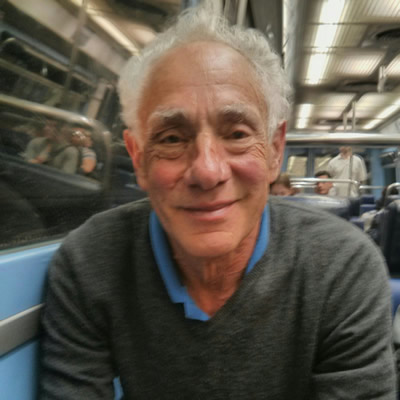
Vic graduated from MIT with a degree in Aero & Astro. He then entered Stanford as a graduate student in Mechanical Engineering and also spent a year in Belgium at the von Karmen Institute for Fluid Dynamics. After completing his Masters Degree he joined the Stanford Artificial Intelligence lab (SAIL) and enrolled for an Engineers Degree, which he completed in 1969. In connection with his Engineers Degree thesis he researched the idea of having a purely digital mechanical arm. This led to the "Orm" that was a prototype a pneumatically actuated multi-degree of freedom snake like arm. In addition, he was instrumental in modifying a Rancho Los Amigos exoskeleton arm for operation under computer control and he also participated in the design of a high-speed computer controlled humanoid hydraulic arm.
The main portion of his Engineers thesis dealt with the design of a six-degree-of-freedom computer controlled electric manipulator that he named The Stanford Arm. He then went on to produce over 10 copies of this Stanford Arm. It became the preferred research device in several university, government and industrial laboratories, and mathematical models of it were used as example in early robotics research papers and textbooks. This design is also deservedly referred to as "The Scheinman Stanford Robot Arm" or simply "The Scheinman Arm."
Vic then developed a six-axis force/torque sensing wrist that could be carried by the Scheinman Arm and other manipulators. This facilitated experiments in force control. He then returned briefly to MIT where he had been invited by Marvin Minsky to design a small humanoid arm for their AI Lab.
After returning to California, Vic started Vicarm, a company that produced copies of both his MIT design, which he named the Vicarm, and his Stanford arm. After several years his company was bought by Unimation, Inc. and was turned into the West Coast Division of Unimation. Vic's first new product, sponsored by General Motors through Unimation, was basically a scaled up industrial version of the Vicarm design. It was named the PUMA manipulator, and was well received both in academia and industry.
Victor left his company in 1980 to found the West Coast office of the computer vision company Automatix. After Vic left, Unimation was purchased by Westinghouse, and subsequently Brian Carlisle and Bruce Shimano, Vic's closest colleagues at Vicarm, arranged to reorganize Unimation's West Coast Division into Adept, Inc. For the rest of his life Vic remained close to and highly supportive of both Carlisle and Shimano.
At Automatix Vic invented Robot World. It was an entirely new concept for robotic use in manufacturing. He intended it to be used for circuit board assemble. Basically it was composed of multiple small manipulators magnetically suspended and free to move under computer control on an air cushion under an x-y table. Eventually Robot World was licensed for manufacture by the Japanese company Fujitsu.
After leaving Automatix Vic devoted his time to consulting and education. He coached design students in Stanford's Mechanical Engineering department and robotics labs. He was also active with High School students whom he mentored in connection with the First Robotics Competitions.
Vic received the Joseph F. Engelberger Award and also the ASME's Leonardo DaVinci Award for his work as a robot designer. Several of his manipulators are exhibited in the Smithsonian Museum in Washington, DC and the Computer History Museum in Mountain View, California. Vic was the consummate engineer. He kept extensive design notebooks, and his home shop was stocked with surplus hardware for electronic, computer and mechanical systems. He was totally a hands-on person, who did his own repairs and designs. He felt he could fix almost anything, and loved figuring out ways to solve problems. He always had a large number of projects going at the same time, and was very generous in providing his tools, parts, labor and expertise to his friends, colleagues and students. He will be greatly missed by the large community that he touched throughout his life with his dynamic personality and generous heart.
Fabrizio Flacco, a tenured research scientist of the French CNRS, suddenly passed away at the age of 34 on 18 September 2016, due to an undiagnosed congenital heart malformation, which burst while jogging with a friend.
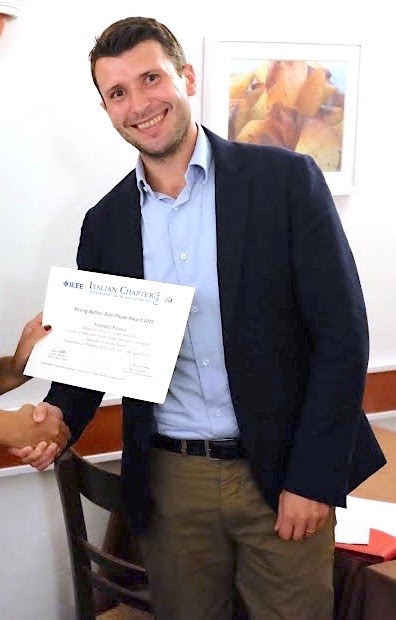
Fabrizio took his master degree in Pisa as a student of Antonio Bicchi in 2007, and received his PhD from Sapienza University of Rome in 2011 with a thesis on "Modeling and Control of Robots with Compliant Actuation", with Alessandro De Luca as supervisor. In between, he spent a research period at the Stanford AI Lab (SAIL) with Oussama Khatib and his group. After a post-doc at Sapienza, working for the FP7 SAPHARI and the H2020 COMANOID European research projects, he became in December 2015, a Chargé de Recherche of the CNRS at LIRMM in Montpellier, in the IDH group led by Abderrahmane Kheddar.
Dr. Flacco has been an IEEE RAS student member from 2009, and then a member since 2012. He served our community in different ways: he was among the promoters of the workshop series on Human-Friendly Robotics (HFR), a very central event for young researchers in the field, organized several workshops at ICRA and IROS conferences, was one of the Associate Editors in the IEEE Robotics and Automation Letters, and Co-Chair of the RAS Technical Committee on Algorithms for Planning and Control of Robot Motion. For a paper that appeared in the IEEE Transactions on Robotics in June 2015, Fabrizio received just few days before leaving us the 2016 IEEE RAS Italian Chapter Award for Best Paper by a Young Author. The Chapter decided right away to name the award after him (see http://www.i-ras.it/node/129).
A collection of memories and pictures can be accessed at http://homepages.laas.fr/afranchi/robotics/remembering-fabrizio. Our heartfelt condolences go to the family, his wife and two little daughters, from all his friends and colleagues.
RAS is pleased to arrange three Luncheon Networking events for our Members attending IROS 2016 in Daejeon, South Korea. Space is limited for these popular events. Don't miss the chance to attend either or both because the space has been filled. Advanced registration is required. The cost is $5 per lunch.
Register Now! https://www.regonline.com/ieeeroboticsandautomationsocietyeventsati_1884632
RAS Women in Engineering Leadership (WIE) Luncheon
Tuesday, 11 October from 12:15-13:30
Emerald Room/ 2F of the Daejeon Convention Center (DCC) (107, EXPO-ro, Yuseong-gu, Daejeon, South Korea)
The Women in Engineering (WIE) luncheon provides an opportunity to foster discussion on the role of women in robotics and automation, inspire girls and promote collaborations and initiatives to advance women in leadership. As the goal for this event is to be more than a lunch for women, but a lunch with women. Therefore, men are more than welcome to participate and enjoy the discussion.
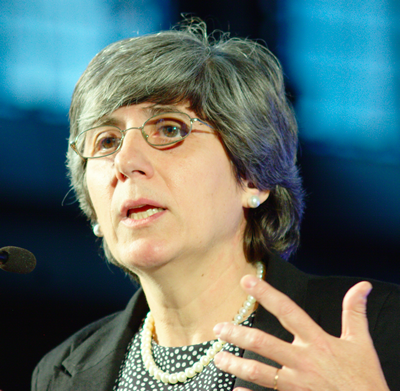
Speaker: Manuela M. Veloso
Manuela is the Herbert A. Simon University Professor in the School of Computer Science at Carnegie Mellon University. She is the Head of the Machine Learning Department, and she has joint appointment in the Computer Science Department and courtesy appointments in the Robotics Institute and Electrical and Computer Engineering Department. She researches in Artificial Intelligence and Robotics. She founded and directs the CORAL research laboratory, for the study of autonomous agents that Collaborate, Observe, Reason, Act, and Learn, www.cs.cmu.edu/~coral. Professor Veloso is IEEE Fellow, AAAS Fellow, AAAI Fellow, Einstein Chair Professor, and the co-founder and past President of RoboCup, and past President of AAAI. Professor Veloso and her students research with a variety of autonomous robots, including mobile service robots and soccer robots. See www.cs.cmu.edu/~mmv for further information, including publications.
There is a $5 USD registration fee to attend. Space is limited and first come, first served, so advanced registration is suggested.
Register here: https://www.regonline.com/ieeeroboticsandautomationsocietyeventsati_1884632
RAS Lunch with Leaders - LwL (for Students)
Wednesday, 12 October from 12:00-13:30
Crystal Ballroom A&B, Lotte City Hotel
This luncheon is open to student attendees and offers the chance to meet and interact with RAS and Industry Leaders. Get your questions answered regarding career advice, the direction of the industry, future growth in robotics & automation, publication practices, etc. YOU decide the topic of conversation!
Confirmed Leaders include:
Satoshi Takodoro, Torsten Kroeger, Martin Buss, Eugenio Guglielmelli, Ron Lumia, Erwin Prassler , Jing Xiao, Ning Xi, Raja Chatila, David Orin, I-Ming Chen, Wolfram Burgard, Allison Okamura
There is a $5 USD registration fee to attend. Space is limited and first come, first served, so advanced registration is suggested.
Register here: https://www.regonline.com/ieeeroboticsandautomationsocietyeventsati_1884632
Young Professionals Luncheon
Wednesday, 12 October from 12:00-13:30
Emerald Room/ 2F of Daejeon Convention Center (DCC)
This luncheon is open to attendees in the early stages of their career. New this Year! Chairs and co-Chairs of the RAS Technical Activities will be available for informal conversation centered on new technologies in robotics & automation, future growth in the field, and how to get involved and contribute to RAS Technical Committee work.
Confirmed RAS Technical Committee Leaders include: (TBD)
There is a $5 USD registration fee to attend. Space is limited and first come, first served, so advanced registration is suggested.
Register here: https://www.regonline.com/ieeeroboticsandautomationsocietyeventsati_1884632
As the ICRA2017 submission deadline approaches, we are looking for Senior Advisors for the Young Reviewers Program (YRP) of the IEEE Robotics and Automation Society (RAS).
The Young Reviewers Program (YRP) is intended to introduce young RAS members to the best practices in peer-reviewing of scientific papers. As a Senior Reviewer, your role would be to give reviewing assignments to Junior Reviewers, and to oversee the review process in a mentor-mentee relationship.
Accepting to serve will not increase the number of papers that you review. Only papers that you have already accepted to review (for ICRA 2017) would be eligible for the YRP. In this way, we believe that there will be no net increase in your reviewing workload. The time you would normally spend writing a careful review would be invested instead in cultivating skills in a Junior Reviewer.
As a Senior Reviewer, you can contact a Junior Reviewer found from the YRP website (https://parasol.tamu.edu/ieee/ras-yrp/)
and assign to the Junior Reviewer one ICRA paper that you have been asked to review and then work with the Junior Reviewer to perfect the review, which you will submit via PaperPlaza (see more details here).
Please join and sign up to the YRP web site, where you can find details of the eligibility and the procedure. https://parasol.tamu.edu/ieee/ras-yrp/https://parasol.tamu.edu/ieee/ras-yrp/
Best regards,
Arash Ajoudani - IEEE-RAS YRP Executive Manager - arash.ajoudani@iit.it
Seth Hutchinson - IEEE-RAS YRP Director - seth@illinois.edu
The Deadline to vote is 25 October 2016!
RAS members are voting to elect six new members of the RAS Administrative Committee to serve 3-year terms beginning 1 January 2017. All RAS members (Graduate Student Members and above) have received voting instructions, the biographies, and statements of the candidates by email. RAS membership must be active as of 13 August 2016 to be eligible to vote. Members who do not have valid emails registered with the IEEE or have opted not to receive e-mail from IEEE, have received their election materials by post.
Use https://eballot4.votenet.com/IEEE to access the ballot and cast your vote now. If you do not remember your password, you may retrieve it on the voter login page.
Voting must be completed no later than 25 October 2016. Any returns received after this date will not be counted. The online voting site will close at 4:00 pm Eastern Time.
Click here to review the candidates' bios and position statements.
If you have any questions about the IEEE Robotics and Automation Society voting process, please contact ieee-rasvote@ieee.org or +1 732-562-3904.
Full Day Workshop #3
13 October 2016 @ IROS'16
https://urldefense.proofpoint.com/v2/url?u=http-3A__www.iros2016.org_autonomous-5Ftechnologies-5Fforum.html&d=DQIDaQ&c=clK7kQUTWtAVEOVIgvi0NU5BOUHhpN0H8p7CSfnc_gI&r=0w3solp5fswiyWF2RL6rSs8MCeFamFEPafDTOhgTfYI&m=dYJPYMc096Lb_7rBC1AOc7gHENqP9dZI1Q2yERnop_s&s=-YWF7cfT4gcqUGgwSqPO43WZBR4F8uklXAHOYp9Ocq0&e=
Organizer: Raj Madhavan, IEEE Future Directions Committee
After two successful workshops at theIEEE PHM'16 conference in Ottawa and at SIPRI , the ATSI Forum at IROS 2016 will allow for discussion on the design of autonomous technologies and their societal impact in both positive and negative ways with particular emphasis on issues relevant to the Asia-Pacific region but not exclusively. Emphasis will be placed not only on technology and public policy issues but also on environmental, cultural, structural, political, and socio-economic factors. Based on the discussions before, during, and after these workshops and forums, a White Paper consisting of valid and balanced reflecting the state-of-the-art with an emphasis on technology and public policy issues that are representative of various stakeholders from across the globe will be published towards the end of 2016. The findings and summaries will be made available via the FDC website for other initiatives and similar efforts to use them as a reference guide to foster discussions within the community and to foster best practices.
Call for Participation and how to submit your extended abstracts:
https://urldefense.proofpoint.com/v2/url?u=http-3A__www.iros2016.org_autonomous-5Ftechnologies-5Fforum.html&d=DQIDaQ&c=clK7kQUTWtAVEOVIgvi0NU5BOUHhpN0H8p7CSfnc_gI&r=0w3solp5fswiyWF2RL6rSs8MCeFamFEPafDTOhgTfYI&m=dYJPYMc096Lb_7rBC1AOc7gHENqP9dZI1Q2yERnop_s&s=-YWF7cfT4gcqUGgwSqPO43WZBR4F8uklXAHOYp9Ocq0&e=
IMPORTANT DATES
Extended Abstract Submission Deadline: 15 September 2016
Notification of Accepted Presentations: 22 September 2016
He was recently announced as the recipient of the prestigious 2017 IEEE Robotics and Automation Award for "Contributions to the development of robot control and human-centered and humanoid robotics, and leadership in the robotics community."
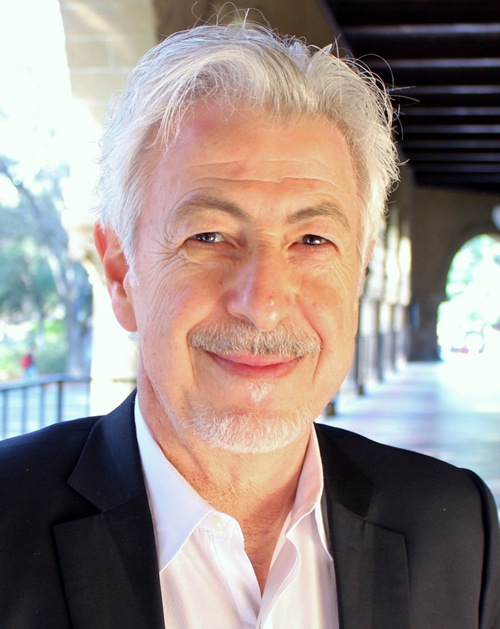
A long time and dedicated Volunteer for the IEEE Robotics & Automation Society, he is now recognized for exemplary work in the field. He will receive his award during the 2017 IEEE International Conference on Robotics and Automation (ICRA) in Singapore on 29 May-3 June 2017.
Oussama Khatib received his Doctorate degree in Electrical Engineering from Sup'Aero, Toulouse, France, in 1980. He is Professor of Computer Science at Stanford University. His work on advanced robotics focuses on methodologies and technologies in human-centered robotics including humanoid control architectures, human motion synthesis, interactive dynamic simulation, haptics, and human- friendly robot design. He is Co-Editor of the Springer Tracts in Advanced Robotics series, and has served on the Editorial Boards of several journals as well as the Chair or Co-Chair of numerous international conferences. He co-edited the Springer Handbook of Robotics, which received the PROSE Award. He is a Fellow of IEEE and has served as a Distinguished Lecturer. He is the President of the International Foundation of Robotics Research (IFRR). Professor Khatib is a recipient of the Japan Robot Association (JARA) Award in Research and Development. In 2010 he received the IEEE RAS Pioneer Award in Robotics and Automation for his fundamental pioneering contributions in robotics research, visionary leadership, and life-long commitment to the field. Professor Khatib received the 2013 IEEE RAS Distinguished Service Award in recognition of his vision and leadership for the Robotics and Automation Society, in establishing and sustaining conferences in robotics and related areas, publishing influential monographs and handbooks and training and mentoring the next generation of leaders in robotics education and research. In 2014, Professor Khatib received the 2014 IEEE RAS George Saridis Leadership Award in Robotics and Automation.
The IEEE Robotics and Automation Award was established in 2002 by the IEEE Board of Directors, and is presented for contributions in the field of robotics and automation. It includes but is not limited to: manufacturing automation; robotics and automation in unstructured environments; sensor design; integration and fusion; robot design; modeling; planning and control; methodologies for robotics and automation, and the quality of the nomination.
Past Recipients can be found HERE
Congratulations to the following IEEE International Conference on Automation Science and Engineering (CASE 2016) Award Recipients! Winners were announced and honored during the Awards Cermeony which took place on 24 August 2016 in Fort Worth, TX USA.
IEEE-CASE Best Conference Paper Award
An annual award to recognize the Best Conference Paper of the IEEE Conference on Automation Science and Engineering (IEEE CASE) presented in current year.
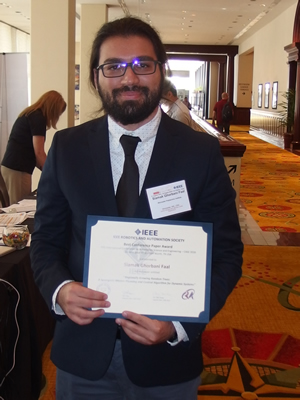
"Regionally Growing Random Trees: A Synergistic Motion Planning and Control Algorithm for Dynamic Systems"
by Siamak Ghorbani Faal and Cagdas Denizel Onal
IEEE-CASE Best Application Paper Award
Best application paper presented at the International Conference on Automation Science and Engineering (CASE) presented in current year.
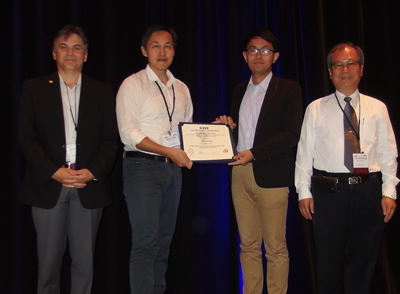
"Context-Aware Activity Prediction Using Human Behavior Pattern in Real Smart Home Environments"
by Ming-Je Tsai, Chao-Lin Wu, Sipun Kumar Pradhan, Yifei Xie, Ting-Ying Li, Li-Chen Fu, and Yi-Chong Zeng
IEEE-CASE Best Student Conference Paper Award
To recognize a student author(s) of a paper presented at the IEEE International Conference on Automation Science and Engineering (CASE) contributing to the notable advancement in automation research: abstractions, algorithms, theory, methodologies, and models that improve efficiency, productivity, quality, and reliability of machines and systems operating in structured environments over extended periods, or that improve the explicit structuring of environments where machines and systems operate.
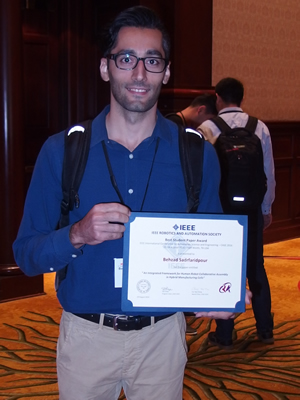
"An Integrated Framework for Human-Robot Collaborative Assembly in Hybrid Manufacturing Cells"
by Behzad Sadrfaridpour, Hamed Saeidi, and Yue Wang
Congratulations to the following Authors for their outstanding achievement as recipients of RAS Publication Awards! The awards were announced and presented at the IEEE International Conference on Automation Science and Engineering (IEEE CASE 2016) on 24 August 2016 in Fort Worth, TX USA.
2016 IEEE Transactions on Automation Science and Engineering Best Paper Award
To recognize the best paper of the IEEE Transactions on Automation Science and Engineering (T-ASE) published in the previous calendar year. Two winners this year!
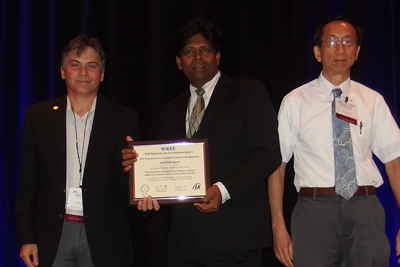
"Fault Detection of Discrete-Time Stochastic Systems Subject to Temporal Logic Correctness Requirements"
by Jun Chen and Ratnesh Kumar
as published in the IEEE Transactions on Automation Science and Engineering; vol. 12, no. 4, October 2015, pp. 1369-1379
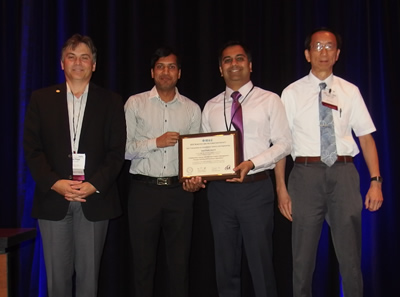
"Collaborative Energy and Thermal Comfort Management Through Distributed Consensus Algorithms"
by Santosh K. Gupta, Koushik Kar, Sandipan Mishra and John T. Wen
as published in the IEEE Transactions on Automation Science and Engineering; vol. 12, no. 4, October 2015, pp. 1285-1296
2016 IEEE Transactions on Automation Science and Engineering Best New Application Paper Award
To recognize the Best New Application Paper of the IEEE Transactions on Automation Science and Engineering (T-ASE) published in the previous calendar year. Two winners this year!
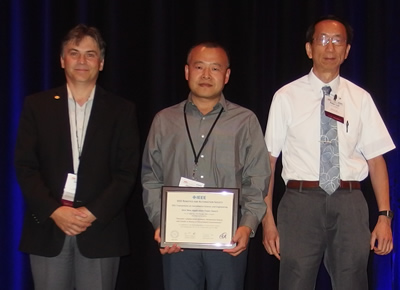
"Dynamic Collaboration between Networked Robots and Clouds in Resource-Constrained Environments"
by Parul Pandey, Dario Pompili, and Jingang Yi
as published in the IEEE Transactions on Automation Science and Engineering; vol. 12, no. 2, April 2015, pp. 471-480
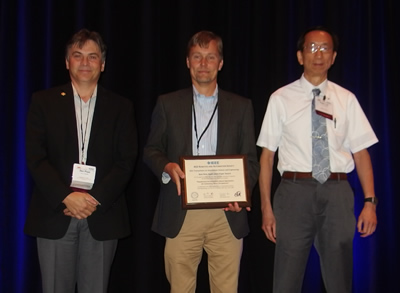
"Regularized Deconvolution-Based Approaches for Estimating Room Occupancies"
by Afrooz Ebadat, Giulio Bottegal, Damiano Varagnolo, Bo Wahlberg and Karl H. Johansson
as published in the IEEE Transactions on Automation Science and Engineering; vol. 12, no. 4, October 2015, pp. 1157-1168
Danica Kragic is a Model, Clothing Designer, Robotics Scientist and Professor. She also helps to guide the IEEE Robotics and Automation Society through her service on the Administrative Committee (AdCom).

Through prior interaction with Vogue Magazine, Danica is now featured in a new "I Am" video campaign, a series intended to put the spotlight on extraordinary women.
View the campaign video here: https://youtu.be/1k-_A75Ju8M
 Student volunteers are needed for the RAS Robotics History project. Volunteers will be asked to assist with web page creation for prominent robotics researchers interviewed for this project. The webpages will host information such as the profiles, videos and interview transcripts of the researchers. Volunteers may also be asked to assist with editing and fact checking of interview transcripts.
Student volunteers are needed for the RAS Robotics History project. Volunteers will be asked to assist with web page creation for prominent robotics researchers interviewed for this project. The webpages will host information such as the profiles, videos and interview transcripts of the researchers. Volunteers may also be asked to assist with editing and fact checking of interview transcripts.
Student volunteers interested in such a project, should send an email to ras@ieee.orgincluding your interest, and a brief description of your web editing skills.
The 2016 IEEE/RSJ International Conference on Intelligent Robots and Systems (IROS 2016) will be held in Daejeon, Korea on 9-14 October 2016. The venue for IROS 2016 is the Daejeon Convention Center (DCC).

Daejeon is the leading city of science and technology in Korea, adjacent to the Daedeok Innopolis, a large research complex where 20,000 engineering graduates are working for over 250 research institutes, universities, and technology companies. It also has many cultural attractions, such as the Daejeon Culture and Arts Center, the Municipal Museum of Arts, and Baekjae Cultural Zone. Various attractions and activities, such as making Korean pottery, ginseng cultivation, and temple stay programs are accessible from Daejeon.
This year's conference is special under many regards. Here are a few highlights and links.
1) Tentative Program: http://www.iros2016.org/overview.html
2) Plenary Talks / Lifetime Talks / Keynote Talks / Special Forums: http://www.iros2016.org/plenaries_and_keynotes.html
3) Workshops and Tutorials: http://www.iros2016.org/workshops_and_turorials.html
33 workshops and tutorials will cover a diverse range of topics offering a unique opportunity to disseminate in-depth information on specific topics in intelligent robotics.
4) Forums: Five forums will be held through the conference.
Futurist Forum: http://www.iros2016.org/futurist_forum.html
Industry Forum: http://www.iros2016.org/industry_forum.html
Entrepreneur Forum & Startup Competition: http://www.iros2016.org/entrepreneurship_forum.html
Government Forum: http://www.iros2016.org/government_forum.html
Autonomous Technologies and their Societal Impact Forum: http://www.iros2016.org/autonomous_technologies_forum.html
5) Competitions: http://www.iros2016.org/competition.html
Three competitions will be held in parallel to the technical program.
The IROS 2016 Autonomous Drone Racing in Mos Espa Daejeon Arena
4th Humanoid Robot Application Challenge
Robotic Grasping and Manipulation Competition
6) Social Events
Apart from the technical programs, participants are also cordially invited to attend various social events, such as the Welcome Reception, Banquet, Farewell Party and Award Luncheon etc. In addition, participants are also encouraged to explore the beautiful city of Daejeon which has an endless supply of attractions and things to see and do.
For more information see: http://www.iros2016.org
Dragon Boat Race: Participants, who apply for the race, will be provided of boats for a practice before the technical program. Final Competition will be held as an opening ceremony of banquet.
Longest Drive Competition in Golfzon: Free trials for participants will be available during the conference dates in Golfzon, which is one of sponsors and next to the DCC.
Explore Daejeon: Free draft beer will be provided at three Western and Korean pubs in downtown on Tuesday evening, Oct. 11, 2016.
Call for Nominations:
Associate Editors needed for the IEEE Robotics & Automation Magazine (RAM)
IEEE Robotics & Automation Magazine is soliciting nominations for two new Associate Editors, to begin in January 2017. The Associate Editors play an important role in maintaining the caliber of the magazine by ensuring the quality of published articles by implementing reviews of technical features according to IEEE guidelines, soliciting interesting and topical material articles for publication in the magazine, guiding the overall direction of the publication and providing feedback from the readership through e-mail conversations, teleconferences, and twice-yearly in-person meetings held in conjunction with IEEE Conference on Robotics & Automation (ICRA) and the IEEE International Conference on Intelligent Robots and Systems (IROS).
Associate Editor terms normally consist of a one-year probation period followed by two years of additional service, if performance is satisfactory. Applicants should have a strong technical background and excellent English language skills. Nominations should include a resume (not to exceed three pages), previous experience with publications as a reviewer or in other capacities, and areas of technical expertise.
Please submit nominations as a single pdf file to Amy Reeder at a.reeder@ieee.org by 30 September 2016.
The IEEE RAS Technical Committee on Mechanisms and Design is seeking applications from energetic researchers and practitioners to serve as Junior Chairs of the TC. The mission of the TC is to bring together researchers in Robot Mechanisms and Design within the IEEE RAS community in order to share knowledge, standardize practices /procedures, and raise the profile of the exciting new work being done in the area, as well as establish strong ties to the robotics and robotic components industries. Viewed as the next generation of leaders for the Technical Committee, the role of the Junior Chairs will primarily be to spearhead additional efforts in support of the mission of the TC and improve the quality of existing efforts. Junior Chairs will be appointed for 1-year terms, with reappointment possible for up to 3 total years.
Interested candidates should send a CV and a "Candidate Statement" outlining your ideas for ways to add to the TC community and offerings (e.g. events, resources), any prior professional leadership activities, and a brief summary of your intended career path. Successful candidates will typically be drawn from those currently holding Postdoctoral Research or Junior Faculty appointments (or their equivalent), but exceptions may be made for especially motivated individuals.
We strongly encourage applications from researchers and practitioners in Industry, especially those who actively participate in the RAS community (e.g. attending conferences).
Applications should be sent via email to aaron.dollar@yale.edu, and should be received by 31 August 2016. Decisions will be made by the TC Co-Chairs.
New this year! Two special tracks on Consumer Robotics will be offered at the IEEE International Conference on Consumer Electronics (ICCE 2017).
8-11 January 2017 in Las Vegas, NV USA
co-organized by IEEE Consumer Electronics Society and IEEE Robotics and Automation Society
co-located with the Consumer Electronics Show (CES 2017)
In a joint effort, IEEE Robotics and Automation Society and IEEE Consumer Electronics Society co-organize two special tracks on consumer robotics at the 2017 IEEE Int. Conf. on Consumer Electronics:
1. Special track "Autonomous Unmanned Aerial Vehicles"
2. Special track "Key technologies for Consumer Robotics"
In the special track on autonomous unmanned aerial vehicles we solicit contributions describing systems as well as basic technologies in this area. Papers with a focus on the consumer applications, such as people tracking or guarding are equally welcome as papers describing UAVs in professional service application such a delivery or surveillance.
Papers contributed to the special track on key technologies for consumer robotics should not describe robotics technologies at large but have a clear and demonstrated relation to a consumer robotics application. We invite papers describing novel systems and applications as well key technologies, such as low-cost perception or low-cost actuation enabling new consumer robots. Preliminary considerations on business models are desired but not a must.
Contributions either in form of a 2-page extended abstract or a 4-page short paper shall be submitted to www.icce.org/
IMPORTANT DATES
Due date for submissions: 12 August 2016
Notification of acceptance: 2 September 2016
Camera-ready paper due: 23 September 2016
ORGANIZERS
Erwin Prassler (Bonn-Rhein-Sieg UoA/Locomotec) Germany
Paul Oh (UN Las Vegas) USA
Satoshi Tadokoro (Tohoku University), Japan
Zexiang Li (HKUST), Hong Kong




